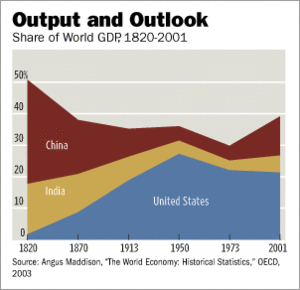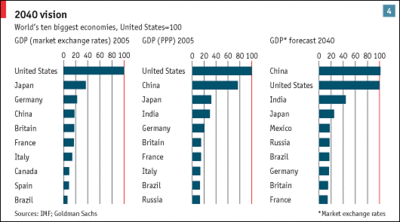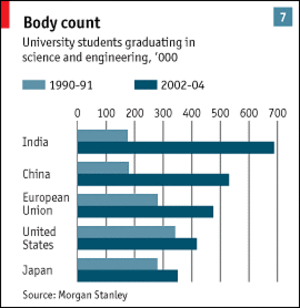I remember 2 years ago the brouhaha over globalization and how every startup needed to adapt or it would die. I truly am a fervent believer in globalization and how offshoring some development work can make a ton of sense from a cost and time advantage (24×7). As I look across our portfolio, what is interesting is that while the comparative advantage of developing in say, India, was once 4 to 1 it is looking like it is more 2:1 or lower as you factor in costs like management overhead, travel, etc. In addition, the companies that actually took advantage of offshore development and were successful were the ones that opened their own wholly-owned Indian subsidiaries. Not only did these companies have their own subsidiaries in India, but they also sent a core team of engineers from the US to open the office, train the staff, manage the team, and provide real incentives like stock options. The portfolio companies that did not fare so well were the ones that had offshore development shops work for them and while the output was fine, it was quite disruptive as the turnover of personnel was quite high. In the end, all I can say is that offshore development for your company is not a panacea, and that you should only do it if it makes sense for your company (read an earlier post for more).
Given that I am quite interested in globalization, I wanted to share with you a few graphs that I saw this week that were pretty impactful for me. First, I recently discovered this piece that Mike Milken wrote for the Wall Street Journal a couple of days ago. I found it on Greg Mankiw’s blog, an economics professor at Harvard and also the Chairman of the Council of Economic Advisors (he is also a former Professor of mine).
 Like Greg, I want to highlight Michael ‘s thoughts on the graph.
Like Greg, I want to highlight Michael ‘s thoughts on the graph.
"China and India combined to produce nearly half the world’s economic output in 1820 compared to just 1.8% for the U.S. Our remarkable growth since 1820 has benefited from democratic institutions, a belief in capitalism, private property rights, an entrepreneurial culture, abundant resources, openness to foreign investment, the best universities, immigration and relatively transparent markets."
In addition, here are two other graphs from this week’s Economist that summarize what the world may look like in the future. I encourage you to read the in-depth survey as it provides some great historical context as well as trends we should watch in the future.
 Tying into Michael Milken’s graph of the world economy in the past is this Goldman Sachs one showing who the economic leaders will be in the future – notice China as #1 and India as #3 by 2040. You can already see from Michael’s graph above that from 1973 to 2001 the US share was diminishing as India and China were growing rapidly.
Tying into Michael Milken’s graph of the world economy in the past is this Goldman Sachs one showing who the economic leaders will be in the future – notice China as #1 and India as #3 by 2040. You can already see from Michael’s graph above that from 1973 to 2001 the US share was diminishing as India and China were growing rapidly.
The last graph is quite interesting as it relates to us technology folks. We have always thought of India and China as places to offshore low-level development work. Yes, alot of that has already been done but what is alarming is what may happen in the future as the comparative advantage that India and China have over us in terms of college graduates in science and math is overwhelming.  Not every one of those graduates according to the McKinsey Global Institute is up to par with the standards that we have in the U.S. (10% in China and 25% in India) but that is clearly changing.
Not every one of those graduates according to the McKinsey Global Institute is up to par with the standards that we have in the U.S. (10% in China and 25% in India) but that is clearly changing.
So what does this mean for us. I am still processing this and would love to hear your thoughts. In my humble opinion, I believe it means that first and foremost, we should continue to fight and compete by stressing education. We cannot fall behind here as it is one of our most important assets. Secondly, I always like to say that the trend is your friend so be on the outlook for how to leverage this labor and talent pool in your current company. It could mean offshoring work (only if you and your team can handle it) or creating new companies that enable global labor arbitrage and collaboration leveraging the Internet (wiki opportunities, open source plays, communications like Gizmo Project, one of our investments). Finally, personally and professionally, pay attention to investment opportunities. There are no secrets why alot of VCs are starting funds in India and China because as these emerging economies grow, income levels rise and with that comes more disposable cash to buy products and services. Like I mention above, it could also mean finding opportunities that leverage the Internet and take advantage of the global talent pool (Logoworks – not one of mine but a great company). From a personal perspective, I have been building a nice allocation in an emerging markets index fund for the last 3 years. Trust me, it is not for the faint of heart and it will be quite a bumpy and volatile ride but looking ahead it is hard to argue with the economic growth in the emerging markets.
Thought-stimulating post. Perhaps it’s obvious, but U.S. K-12 education will remain second rate because of the stranglehold that the teachers unions have that prevents competition and innovation. It’s in K-12 that students develop a thirst for math and science.
Ed,
I’m glad you’re thinking about these issues and thanks for offering your thoughts.
Globalization can’t be a dirty word. People need to embrace it, even if it means some American jobs will be lost as we face competition from abroad.
I think national competitivness is important, but embracing the rise of China and India is equally important, so we can work together to solve global problems.
Darrell I agree with you wholeheartedly, but go even further. Once kids leave high school, they are faced with the soaring costs of a college education. Grants are not keeping up with the rate increases. Here in Iowa, the 3 major universities have all increased tuition by double digits rates the last three years.
I know a number of people who have foregone a BA and just went to a community college, because they cannot afford more.
Sitting here in Beijing, with the buzz that surrounds us from cranes (17 visible from my office window), new technologies, and VC’s buzzing around… I can only sit and wonder what everyone is surprised about?
This is a very good and thought provoking post because it ties a few things together. Education is a looming problem. Hopefully it will be a core platform issue for the next government.
To get an excellent visual picture of where we have our spending priorities as a country you might find this link of interest.
http://www.thebudgetgraph.com/view.html
From an investment standpoint I think every long-term portfolio needs substantive exposure to the growth in these rapidly developing economies.
I definitely agree that as these emerging markets accumulate wealth, and we manage to continue to innovate & live ahead of the curve, America stands to benefit greatly from the investment of those countries in to our economy. However, therein is the crux of the challenge we face in this newly globalised society; that financial inflow can come and go just as freely. Open capital markets are a great thing, and so is the open dissemination of information, but being ahead of the curve in a constantly-equalizing market is the only way to sustain value.
And, the only way we can do this well over the long-term is by leading the pack in education. Something which, as you point out, we are clearly not doing right now.
Education has to be a core platform issue for the next government. There can be no other way.
As an investor I agree with many of your points. As an employee I disagree with most of your points. Most workers (95%+) in the United States have little personal ability to leverage off of international labor rate advantages. All the average or even well above average programmer can do is watch their salary or consulting rate steadily drop. It is a sad state of affairs. For most American workers, globalization spells big trouble ahead, *not* opportunity. Plenty of opportunity for investors, very little for employees. We are headed for a global lowest common denominator that for most American workers spells disaster.
Wow, a very interesting and provocative GDP graph. Who’d have thunk that it’s not a rise of China and India, it’s a *resurgence* of economic might.
This reprint link seems to work for the Michael Milken WSJ article – http://webreprints.djreprints.com/1552621259811.html
Nice post Ed.
I have made some comments here.
http://global-themes.com/india-china-outsourcing-globalization/
Also, would welcome your thoughts on the whole category of “Globalization” posts on my blog:
http://global-themes.com/category/globalization/
Thought provking graphs. Ed, I will send you an email offline.